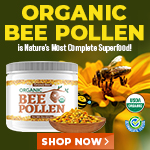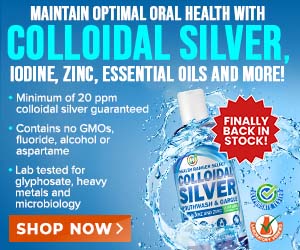
UCLA study shows altering fatty acid levels in diet may reduce prostate cancer growth rate (press release)
Friday, September 29, 2006 by: NewsTarget
Tags: health news, Natural News, nutrition
- Pfizer's RSV vaccine linked to preterm births as drug giant CONCEALED RISKS from pregnant women in unethical clinical trials
- Dane Wigington exposes climate engineering as ‘All-Out Weather and Biological Warfare’
- Sen. Johnson demands COVID vaccine makers hand over all documents, communications, as evidence against their products reaches a climax
- Photonic revolution: New chips process data using light instead of electricity
- Criminal referral requests filed against Fauci and top COVID officials in seven states
- EU pauses retaliatory tariffs as Trump temporarily halts new duties
- Israeli lobbyists boast of controlling US national security policy in leaked AIPAC audio
- The humble Potato: Nutritional benefits and how to enjoy it the healthy way
- Analysis: The coming economic collapse, a mass uprising and Trump's three secret weapons to halt the growing revolt
- Tulsi Gabbard leads charge against the Biden regime’s global censorship of the 'Disinformation Dozen'
- Aerosolized bioweapons? Strange “diploid biomasses” falling out of the sky in Florida captured under the microscope
- Aluminum, essential to vaccine science, also causes serious health conditions, including chronic fatigue, neurodegenerative diseases, macrophagic myofasciitis
- Fauci is back in the limelight, and he’s busy promoting a future COVID or FLU pandemic
- DOGE unveils $400M unemployment fraud scandal: Toddlers, futuristic birthdates fuel outcry
- Shedding light on the dark side of MMR vaccines: How vaccinated individuals SPREAD MEASLES & put the vulnerable at risk
- Chemtrails unveiled: How the CIA and Big Business are manipulating the weather for profit
- U.S. lawmakers investigate Meta over alleged China collaboration
- Kiss Your Genetic Privacy Good-Bye! 23andMe Gets Green Light to Sell Your Intimate Genetic Details to Anyone They Want
- Aerosolized bioweapons? Strange “diploid biomasses” falling out of the sky in Florida captured under the microscope
- Widespread social and economic unrest: Steve Quayle issues urgent financial warning of imminent asset collapse in new interview with Mike Adams
- Tulsi Gabbard leads charge against the Biden regime’s global censorship of the 'Disinformation Dozen'
- Fauci is back in the limelight, and he’s busy promoting a future COVID or FLU pandemic
- Analysis: The coming economic collapse, a mass uprising and Trump's three secret weapons to halt the growing revolt
- Kiss Your Genetic Privacy Good-Bye! 23andMe Gets Green Light to Sell Your Intimate Genetic Details to Anyone They Want
- CLOT SHOT PLANDEMIC UNFOLDING: Fibrous, rubbery clots caused by covid injections have prion-like seeding activity
- Mike Adams releases country western hit single: Goin’ Back in Time is Comin’ Home
- DEATH by VACCINE or face PRISON time: Canadian Freedom Convoy leaders CONVICTED for protesting forced vaccination during the Covid Plandemic
- Tulsi Gabbard takes aim at censorship: Justice for the ‘Disinformation Dozen’
- How Israeli military-connected corporations are secretly controlling your online privacy
- European Court of Justice: Healthcare professionals who promoted or administered COVID-19 vaccines are CRIMINALLY LIABLE for any harm caused
- Defunding DEADLY mRNA jabs: Government funding for mRNA technology being scrutinized and sidelined until proven "safe and effective" for real
- U.S. lawmakers investigate Meta over alleged China collaboration
- Federal employees whine over DOGE's new directive requiring them to do a 5-point summary of weekly accomplishments
- U.S. approves new Russian ambassador as diplomatic thaw continues
- Trump administration poised to overhaul crypto regulations with new SEC leadership
- I Want My Bailout Money – new song and music video released by Mike Adams
- Newly released JFK files reveal Pentagon's role in creating Lyme disease and covid in the same lab
- Analysis: The coming economic collapse, a mass uprising and Trump's three secret weapons to halt the growing revolt
- Mike Adams releases country western hit single: Goin’ Back in Time is Comin’ Home
- MEDICAL BOMBSHELL: FDA admits Covid mRNA 'Vaccines' CAUSE CANCER
- Aerosolized bioweapons? Strange “diploid biomasses” falling out of the sky in Florida captured under the microscope
- Trump reverses course on Gaza plan, says “nobody is expelling Palestinians”
- Dr. Mike Yeadon releases 15-minute testimony - WATCH - about genocidal intent of COVID “vaccines”
- Kiss Your Genetic Privacy Good-Bye! 23andMe Gets Green Light to Sell Your Intimate Genetic Details to Anyone They Want
- 5 Simple steps to boost your brainpower: How to strengthen executive function in a distracted world
- A lack of integrity in Academia: Harvard professor found GUILTY of fraudulent research to promote CRT theory
- The Health Ranger releases “Vaccine Zombie” song and music video, using AI-animated zombies for the music video
- California's social media censorship law struck down: A victory for free speech or a threat to online safety?
- Rep. Nancy Mace introduces bill to ban biological males from female facilities on federal property
- EPA advisor admits the agency is funneling billions to climate groups ahead of Trump’s return to White House
- Survival 101: Effective EMF blocking techniques
- OpenAI whistleblower who dissented against how the company trained ChatGPT found dead
- Space war brewing? Russia threatens to destroy Starlink satellites
- European Court of Justice: Healthcare professionals who promoted or administered COVID-19 vaccines are CRIMINALLY LIABLE for any harm caused
- Red Cross issues warning to stop blood plasma donations from vaccinated people
- Scientists confirm: GENIUS brain function can be spontaneously unleashed in humans without any apparent cause
- EPA advisor admits the agency is funneling billions to climate groups ahead of Trump’s return to White House
- HYSSOP: What research reveals about the health benefits of this ancient holy herb
- Two containers with completed ballots fall out of truck in Florida
- Newly released JFK files reveal Pentagon's role in creating Lyme disease and covid in the same lab
- Global leaders unite to clamp down on “misinformation” with UN-backed Cascais Declaration
- Fully vaccinated about to see “tsunami” of illness and death, warns virologist
- BREAKING: 2025 NDAA authorizes mandatory military draft of WOMEN across America… as Pentagon pursues global NUCLEAR war with both Russia and China at the same time
- Michael Yon warns of a ZIONIST TAKEOVER in Trump’s second administration
- Ozempic and Wegovy weight loss drugs are injectable LIZARD VENOM PEPTIDES that may unleash a devastating wave of organ failure… side effects align with symptoms of SNAKE BITES
- The Health Ranger releases “Vaccine Zombie” song and music video, using AI-animated zombies for the music video
- BOMBSHELL: DNA testing kits are a SCAM to develop ethnic-specific bioweapons
- Mike Adams releases country western hit single: Goin’ Back in Time is Comin’ Home
- Israeli soldiers accused of even more torture and abuse in the West Bank
- These 13 countries just signed an agreement to engineer a global FAMINE by destroying food supply
- NASA admits that climate change occurs because of changes in Earth’s solar orbit, and NOT because of SUVs and fossil fuels
- RFK Jr. clears key hurdle: Sen. Susan Collins backs controversial HHS nominee, signaling a new era for health policy
Published in the Aug. 1 issue of the journal Clinical Cancer Research, this initial animal-model study is one of the first to show the impact of diet on lowering an inflammatory response known to promote prostate cancer tumor progression and could lead to new treatment approaches.
The omega-6 fatty acids contained in corn, safflower oils and red meats are the predominant polyunsaturated fatty acids in the Western diet. The healthier marine omega-3 fatty acids are found in cold-water fish like salmon, tuna and sardines.
"Corn oil is the backbone of the American diet. We consume up to 20 times more omega-6 fatty acids in our diet compared to omega-3 acids," said principal investigator Dr. William Aronson, a professor in the department of urology at the David Geffen School of Medicine at UCLA and a researcher with UCLA's Jonsson Cancer Center. "This study strongly suggests that eating a healthier ratio of these two types of fatty acids may make a difference in reducing prostate cancer growth, but studies need to be conducted in humans before any clinical recommendations can be made."
Scientists used a special mouse model for hormone-sensitive prostate cancer that closely mirrors the disease in humans. Researchers fed one group of mice a diet comprised of 20 percent fat with a healthy one-to-one ratio of omega-6 to omega-3 fatty acids. A second group of mice were fed the same diet but with the fat derived from mostly omega-6 fatty acids.
The study showed that tumor cell growth rates decreased by 22 percent and PSA levels were 77 percent lower in the group receiving a healthier balance of fatty acids compared with the group that received predominantly omega-6 fatty acids.
The most likely mechanism for the tumor reductions, according to researchers, was due to an increase of the prostate tumor omega-3 fatty acids DHA and EPA and a lowering of the omega-6 acid known as arachidonic acid. These three fatty acids compete to be converted by cyclooxgenase enzymes (COX-1 and COX-2) into prostaglandins, which can become either pro-inflammatory and increase tumor growth, or anti-inflammatory and reduce growth.
Researchers found that pro-inflammatory prostaglandin (PGE-2) levels were 83 percent lower in tumors in the omega-3 group than in mice on the predominantly omega-6 fatty acid diet, demonstrating that higher levels of DHA and EPA may lead to development of more anti-inflammatory prostaglandins.
"This is one of the first studies showing changes in diet can impact the inflammatory response that may play a role in prostate cancer tumor growth," Aronson said. "We may be able to use EPA and DHA supplements while also reducing omega-6 fatty acids in the diet as a cancer prevention tool or possibly to reduce progression in men with prostate cancer."
Currently, the research team is conducting a clinical trial with men who are undergoing prostate removal due to cancer to compare the effects of a low-fat diet using omega-3 supplements and a balanced Western diet. Aronson said that positive findings from this study may lead to larger clinical trials.
In addition, Aronson said that further study might show that COX-2 inhibitors or non-steroidal anti-inflammatories (NSAIDS) combined with omega-3 supplements also may lower the inflammatory response in prostate cancer development.
Contact: Rachel Champeau rchampeau@mednet.ucla.edu 310-794-2270 University of California - Los Angeles
Health news at FETCH.news
Get independent news alerts on natural cures, food lab tests, cannabis medicine, science, robotics, drones, privacy and more.
Take Action: Support Natural News by linking to this article from your website
Permalink to this article:
Embed article link: (copy HTML code below):
Reprinting this article:
Non-commercial use OK, cite NaturalNews.com with clickable link.
Follow Natural News on Facebook, Twitter, Google Plus, and Pinterest
Science News & Studies
Medicine News and Information
Food News & Studies
Health News & Studies
Herbs News & Information
Pollution News & Studies
Cancer News & Studies
Climate News & Studies
Survival News & Information
Gear News & Information
News covering technology, stocks, hackers, and more



"Big Tech and mainstream media are constantly trying to silence the independent voices that dare to bring you the truth about toxic food ingredients, dangerous medications and the failed, fraudulent science of the profit-driven medical establishment.
Email is one of the best ways to make sure you stay informed, without the censorship of the tech giants (Google, Apple, Facebook, Twitter, YouTube, etc.). Stay informed and you'll even likely learn information that may help save your own life."
–The Health Ranger, Mike Adams













































